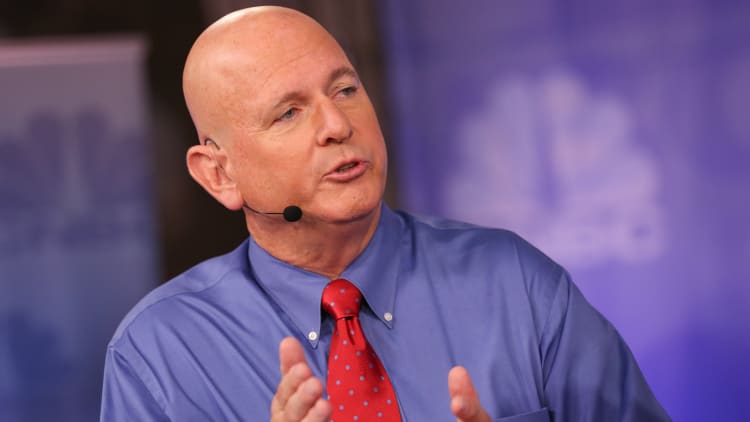In the history of the earth's climate two years is a infinitesimal blip, but in the recent history of investor-led efforts to push for action on climate change from corporations, two years has meant a great deal.
In 2017, the two biggest U.S.-based fund managers, BlackRock and Vanguard — which control a combined $12 trillion in assets — both voted to require Exxon Mobil to produce a report on climate change. It was a seen as watershed moment showing what can occur when the biggest index funds punch their weight at the annual meetings of corporations, and join other shareholders in supporting proxy proposals covering social issues.
Until it wasn't the watershed everybody thought it was.
Since that 2017 vote, multiple analyses of proxy votes have shown BlackRock and Vanguard to have among the worst voting records when it comes to social issues supported by other shareholders, including many of their peers among the world's largest asset managers.
Among 48 large fund companies that Ceres included in its review of up-or-down votes on climate-related shareholder proposals from the 2018 proxy season, Vanguard finished 42nd (voting for climate proposals 12 percent of the time), and BlackRock finished 43rd (voting in favor of these resolutions 10 percent of the time).
BlackRock, Vanguard sway voting results
A recent Morningstar report showed that in the 2019 proxy season, 177 shareholder initiatives addressing social and environmental concerns were voted at U.S. companies' annual general meetings and averaged 29% support, a record high for the second year in a row. And without the help of BlackRock and Vanguard votes in most instances. This year, 84 resolutions addressing social factors that impact financial performance received more than 30% support of shareholders — BlackRock and Vanguard supported only 10% of these resolutions.
Why does that matter?
BlackRock and Vanguard control the largest blocks of shares in nearly every publicly-traded firm in the U.S., including in the carbon-intensive energy and utility industries. The two asset managers were both in the top five common stock shareholders at 28 companies with climate resolutions in 2019, according to an analysis by the Climate Majority Project, and the two largest shareholders at 18 of these 28 companies. Their stock holdings are so significant that at least 16 of these climate votes would have received majority support if both had voted in favor of them.
"With the Exxon Mobil vote we though, 'This is it,'" said Jackie Cook, director of stewardship strategy at Morningstar. "It's so surprising that the two asset managers most invested in the future are the ones that are not taking the issue to the next level. ... The rest of shareholders are leaving them behind."
"We thought they had gotten religion on climate change," said Andrew Logan, director of the oil and gas program at CERES, a nonprofit that works with institutional investors on sustainability efforts. "But the last two years suggest that isn't the case, or was an overly generous interpretation,"
'Name and shame' campaigns
To BlackRock and Vanguard, the outcry from other shareholders amounts to little more than a "name and shame" campaign. They say the criticisms reveal a fundamental misunderstanding of their approach to engagement with the corporations they own. The Exxon Mobil vote, and another high-profile one during the 2017 proxy season against management at Occidental Petroleum, were never intended to signal that that either company viewed proxy votes as the best way to engage with companies. They favor multi-year, direct dialogue with management, and only when that fails turning to a vote. In the case of BlackRock, when it comes to voting, they favor "informed voting" against directors rather than on proxy proposals that can be seen as attempting to usurp the role of management.
BlackRock has voted against or withheld votes from nearly 4,800 directors at 2,700 different companies globally. In the past year, it engaged 207 companies globally on the topic of climate risk, 34 of which were engaged multiple times.
While BlackRock only supported five of the 36 climate-related shareholder proposals that came to a vote in the U.S. during the same period, its engagement campaigns, "far exceed" the voting totals, BlackRock said in an emailed statement.
"Vanguard is concerned about the impact of climate change risk," said a Vanguard spokeswoman by email. "Vanguard has pursued an engagement strategy that focuses on a board's climate governance and oversight of climate risk or climate strategies, and on comparable and investor-relevant disclosures."
The Vanguard spokeswoman noted that in this proxy year Vanguard engaged with approximately 250 companies in carbon-intensive industries to discuss their governance and disclosure of climate risk, a topic covered in its 2019 Investment Stewardship report. It also makes a clear distinction in its proxy voting guidelines between measures it will consider supporting, covering general disclosures about climate, and measures it won't — ones that require companies to commit to specific business targets, a task it believes must remain with management.

The Climate Majority Project found that BlackRock and Vanguard voted for 99% of U.S. large capitalization energy and utility company-proposed directors. "BlackRock and Vanguard not only voted with management more often than most of their asset manager peers; they were also more likely to support management at these fossil fuel intensive companies than they did across U.S. equities overall," the group stated in an analysis.
To other shareholders, the concept of direct engagement can best summed up in a more ambiguous way — BlackRock and Vanguard are saying, "Trust us."
A 'black box' of engagement efforts
No matter how many words the two companies print in annual stewardship reports, there are no details on a company-by-company basis and no quantitative metric — like a proxy voting record — on which to judge their progress.
"The real issue with the Vanguard and BlackRock approach is that it is a black box," Logan said. "I don't think at a high level we disagree with the idea that engagement can lead to progress, but we've spent quite a bit of time in climate debate and the time for confidential engagement has passed." He added, "the idea that they can say just 'trust us' engaging with these companies and not provide evidence it is yielding any change ... it is fair to say we are disappointed with the lack of tangible, specific disclosure from Vanguard and BlackRock."
CNBC Evolve will return, this time to Los Angeles, on Nov. 19. Visit cnbcevents.com/evolve to apply to attend.
Morningstar's Cook said the size of their investment stewardship programs is bigger than those at most asset management — which runs counter to the idea that the low-cost index fund providers could not afford to spend on engagement. But she said the engagement efforts remain difficult to judge.
"More and more engagement and talk, and they don't give us timelines, and we not able to judge the efforts. For investors, it is frustrating to be told, 'Just hang on, we're making progress.'" She added, "They put so much emphasis on those engagement reports, but you can't see it from the engagement reports. ... It does come down to the votes. Using your vote is what you have as investor vote attached to your shares."
For investors, it is frustrating to be told, 'Just hang on, we're making progress.'Jackie Cookdirector of stewardship strategy at Morningstar
Cook said there may be a bit of self-importance on the part of these companies, especially when reflecting the fact that they do not join investor coalitions. They do join standards-setting organizations including the Sustainable Accounting Standards Board and the Task Force on Climate-related Financial Disclosures.
"Are the largest asset managers too big, too much hubris to be part of these coalitions?" Cook asked. "Climate Action 100+ is a good example, its agenda is investment stewardship."
BlackRock said in its statement to CNBC, " We only join external groups when we believe that collective action can significantly augment our direct engagements. We try to avoid initiatives that duplicate our own efforts or that may cause confusion for companies."
Of the 207 companies BlackRock engaged on climate risk this year, 43 overlapped with the Climate Action 100+ list of target companies.
BlackRock and Vanguard voted against all of the U.S. shareholder proposals backed by Climate Action 100+, which represents $34 trillion in assets.
Notably, even the funds designed by BlackRock and Vanguard to invest using environmental, social and governance screens, ESG-branded portfolios, voted in favor of shareholder resolutions less frequently than peers. According to a new Morningstar analysis, Vanguard ESG funds voted in "the low single digits" percentage-wise on resolutions, while iShares ESG funds voted in favor of only 22% to 31% of "highly supported resolutions."
The battle over the best approach to corporate engagement by shareholders is occurring at a moment when there are conflicting signs about the future power of the shareholder resolution.
Even though the 30% support for proposals in 2019 was a record, the number of resolutions coming to a vote declined significantly. Many proposed resolutions were withdrawn because shareholders felt dialogue with management was constructive. But some resolutions, including one proposed by Exxon Mobil shareholders, were removed from proxy ballots in 2019 as a result of Securities and Exchange Commission rulings to allow management to exclude.
Many shareholders say the SEC has become less shareholder-proposal friendly in recent years. Robert Jackson, the politically independent SEC Commissioner most outspoken on the power of big index funds and lack of transparency over proxy voting, announced he would leave the SEC earlier this year to return to teaching at New York University, but remains on the Commission at this time as the search for a replacement continues. Another SEC Commission, Republican Hester Peirce, referred to "peddlers of ESG products and philosophies" in a June speech before the conservative business lobby the American Enterprise Institute, and called out BlackRock CEO Larry Fink's focus on ESG issues specifically.
Political backlash
Some socially-geared investor advocates are harsh in their assessment of BlackRock and Vanguard.
"We just see BlackRock and Vanguard as being conflicted," said Andy Behar, CEO of shareholder activist group As You Sow.
Behar went as far as to say the companies are afraid of losing investment management business, such as 401(k) plan administration, at corporations where they vote against management. Concerns about conflicts of interest were recently studied by Harvard Law School corporate governance expert Lucian Bebchuk and Boston University law professor Scott Hirst, who also is the director of institutional investor research at Harvard Law's corporate governance program. They concluded there were incentives for the biggest index fund companies to "defer excessively" to corporate managers. While they looked at "say-on-pay" proposals where the big index funds were more pro-management than actively managed funds, similar reasoning would apply to environmental issues.
What they found beyond concerns about losing business, access to C-suites and bearing the expense of engagement in a sector defined by low costs, was a political minefield for index fund companies whose success has reached a point of market dominance, and over which regulatory concerns may grow. As the power of BlackRock, Vanguard and State Street Global Advisors grows, "the most significant risk" is likely to be a backlash reaction to these companies as another "Wall Street" monopoly with power over "Main Street."
"There potential stewardship activities could pose a substantial threat to incumbents' power and interests, and could thereby lead to regulatory backlash. ... Because managers control the massive resources of Main Street companies, they are a formidable foe in the political arena."
The role index funds play in corporate responsibility as the consume more of the assets of investors was one of the last major topics on the mind of Vanguard founder Jack Bogle at the time of his death.
In fact, after the 2017 Exxon vote a group called the "Main Street Investors Coalition" attacked the role of asset managers including BlackRock and Vanguard in shareholder efforts, and the role of shareholders more broadly in pushing environmental, social and governance efforts.
A strategy of deference would likely convert corporate managers into quiet allies rather than foes.Scott Hirst and Lucian BebchukBoston University School of Law and Harvard Law professors
Morningstar's Cook thinks this is a more likely conflict than 401(k) plan management, or other ideas cited for the poor voting record, such as fears that BlackRock and Vanguard could lose access to management teams. "Which management is going to close the door on BlackRock or Vanguard, the two largest, most influential fiduciaries in the market? I can't see how they would really need to worry about that."
But the risk of big lobbying dollars being used to not only oppose, but weaken them, is real, she said.
"The Mainstreet Investors Coalition was a funded by lobbying groups representing manufacturers to make a conservative, fossil-fuel backed argument," Cook said.
"The Big Three can reduce the risk of a backlash by limiting the extent to which their stewardship constrains the power, authority, compensation, and other private interests of corporate managers. Indeed, a strategy of deference would likely convert corporate managers into quiet allies rather than foes," the Harvard Law professors wrote.
Lobbying is a big proxy issue itself, with measures in the past year targeting Ford and GM to make lobbying disclosures, as well as energy and utility companies. Of the 13 resolutions related to lobbying and political activities, six had sufficient shareholder backing that had BlackRock and Vanguard voted in favor, they would have received majority support, according to the Climate Majority Project, including measures introduced at the annual meetings of Exxon, Duke Energy and NextEra Energy. Separately, both Duke and NextEra have committed to net-zero carbon emissions by 2050.
Index funds can't sell, but investors can
As Bogle noted in some of his last warnings about the role of index funds in corporate responsibility, these funds cannot simply walk away from a company they own, they cannot sell the shares if the stock is part of an index their fund is tracking.
But investors can vote with their feet when it comes to where they invest their money. As You Sow's Behar says it is only a matter of time before more investors become aware of the fact that these fund companies are "running interference for the most egregious climate offenders. They will start moving their money. Doesn't have to be with BlackRock and Vanguard."
Retail investors, especially those in company-run retirement plans, have limited information and options, though more tools are being built online to analyze portfolio holdings. And more money is flowing into ESG funds. Morningstar data shows $13.5 billion going to ESG mutual fund and ETF portfolios so far in 2019, a record amount of investor activity into these funds and double last year's level.
Cook said it is a fact that more asset owners are asking about stewardship efforts of manager and it will be much bigger part of the process of selecting asset managers for institutional investors. "The largest pension funds in the world are the largest asset owners and are members of Climate Action 100+. BlackRock and Vanguard are not. Pressure will come."
"Some investors have been totally in the dark in the past, but now there is a whole chain of accountability, and investors are starting to become more aware of the chain," she said. "We are starting to hone in on the big two," Cook said. She did not include State Street Global Investors because while a large asset manager, it is not near the size of the other two, and its voting record remains better.
U.K.-based insurance and asset management giant Legal & General won a large equity index mandate from the biggest government pension fund in the world earlier this year. Climate shareholders have pointed to Legal & General's better record voting on shareholder proposals. It has a record of supporting climate and lobbying disclosure proposals that ranks above most of the largest U.S.-based asset managers, with PIMCO an exception. Neither Legal & General nor the Japanese Government Pension Investment Fund pointed to ESG issues as a specific reason for the investment mandate, and there was no indication any other manager was being replaced. Of the $1 trillion-plus Japanese pension fund's six equity index managers, two are foreign companies — BlackRock and SSGA. The head of the Japanese pension fund was quoted last year saying that BlackRock is its biggest index manager.
To date, it can only be stated that the shareholders advocates focused on ESG issues are the ones that have lost faith.
"I don't think they will ever change," Behar said.
This story has been updated to include data from a Morningstar analysis published on Oct. 11 detailing the proxy voting records of BlackRock and Vanguard ESG-branded funds, as well as record total flows into ESG portfolios in 2019.






